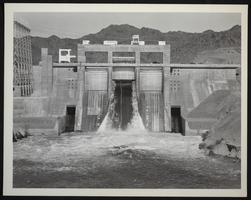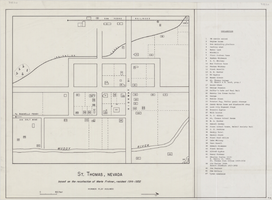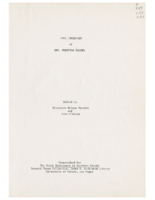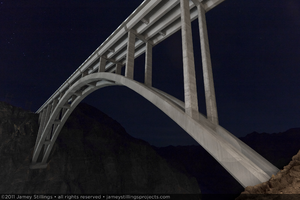Search the Special Collections and Archives Portal
Search Results

Photograph of Davis Dam, January 25, 1951
Date
Archival Collection
Description
Image

Map of St. Thomas, Nevada, circa 1933
Date
Archival Collection
Description
Image
Insignia Films Research for the American Experience: Las Vegas - An Unconventional History
Identifier
Abstract
The Insignia Films Research for the "American Experience: Las Vegas - An Unconventional History" collection (1968, 2004-2005) contains photocopied research material, primarily drawn from Nevada newspapers, photographic prints, Betacam and VHS videotapes with interviews and footage used in the Public Broadcasting System (PBS) series "American Experience: Las Vegas - An Unconventional History," created for the Las Vegas Centennial, Las Vegas, Nevada. Also included are original issues of Look magazine with Las Vegas, Nevada coverage, and a United States Freedom of Information Act (USFOIA) report on Tony Spilotro.
Archival Collection
Elbert Edwards oral history interview
Identifier
Abstract
Oral history interview with Elbert Edwards conducted by Layne Covington on October 16, 1986 for the Ralph Roske Oral History Project on Early Las Vegas. Edwards first talks about his family background before talking about what it was like to live in Panaca, Nevada. Edwards later talks about his wife’s and his political involvement, and his involvement in education. He then discusses Hoover (Boulder) Dam, his job as a registrar in the Selective Service, and the effects that the World War II years had on Las Vegas, Nevada.
Archival Collection
Hoover (Boulder) Dam maps, drawings, and brochures, 1927 to 1991
Level of Description
Scope and Contents
The Hoover (Boulder) Dam maps, drawings, and brochures series (1927-1991) includes maps and brochures highlighting the dam's history, scenic routes, and points of interest in the dam's vicinity.
Archival Collection
Collection Name: UNLV University Libraries Collection of Boulder City, Hoover Dam, and Lake Mead National Recreation Area Maps and Brochures
Box/Folder: N/A
Archival Component

Photograph of Rioville, Nevada, circa 1900
Date
Archival Collection
Description
Rioville, also known as Bonelli's Landing, Nevada.
Transcribed Notes: Notes on attached sheet: Rioville, Nevada (also known as Bonelli's Landing). It now lies at the bottom of Lake Mead, formed behind Hoover Dam. Rioville was founded by Daniel Bonelli, a Mormon pioneer sent by Brigham Young, about 1865 at the mouth of the Virgin River.
Image

Transcript of interview with Rev. Prentiss Walker by Bernard Timberg, January 27, 1974
Date
Archival Collection
Description
Interview with Rev. Prentiss Walker conducted by Bernard Timberg on January 27, 1974. Born on an Oklahoma Indian Reservation in 1910, Walker arrived in Las Vegas in 1933 in hopes of working on Hoover Dam construction. After working in various jobs, he became ordained as a Baptist minister. Walker discusses job discrimination and living "uptown."
Text

Photograph of the Mike O'Callaghan-Pat Tillman Memorial Bridge, Nevada-Arizona border, January 12, 2011
Date
Archival Collection
Description
Image
Robert Brown oral history interview
Identifier
Abstract
Oral history interview with Robert “Bob” Brown conducted by Ian McLaughlin on February 23, 1981 for the Ralph Roske Oral History Project on Early Las Vegas. Brown discusses his background in the food business working for various hotels and restaurants in the city. Brown discusses some of the developments of the Las Vegas Strip in Nevada, including the opening and closing of various casinos, as well as issues relating to the increasing crime rate, rise in air pollution, and growth in population in the city. Brown also mentions some of the entertainers from the Strip such as Wayne Newton and Frank Sinatra, and he describes the various recreational activities available to Las Vegans in and around the city. The interview concludes with Brown’s discussion about how means of transportation have evolved and how the city has grown since he moved to Las Vegas.
Archival Collection
